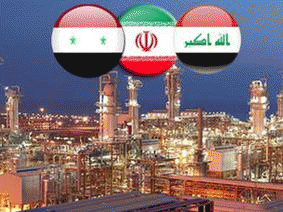The US$10 billion, 6,000 kilometer pipeline is set to start in Iran's South Pars gas field (the largest in the world, shared with Qatar), and run via Iraq, Syria and ultimately to Lebanon. Then it could go under the Mediterranean to Greece and beyond; be linked to the Arab gas pipeline; or both.
Before the end of August, three working groups will be discussing the complex technical, financial and legal aspects involved. Once finance is secured -- and that's far from certain, considering the proxy war in Syria -- the pipeline could be online by 2018. Tehran hopes that the final agreement will be signed before the end of the year.
Tehran's working assumption is that it will be able to export 250 million cubic meters of gas a day by 2016. When finished, the pipeline will be able to pump 100 million cubic meters a day. For the moment, Iraq needs up to 15 million cubic meters a day. By 2020, Syria will need up to 20 million cubic meters, and Lebanon up to 7 million cubic meters. That still leaves a lot of gas to be exported to European customers.
Europeans -- who endlessly carp about being hostages of Gazprom -- should be rejoicing. Instead, once again they shot themselves in their Bally-clad feet.
Want war? Here's the bill
Before we get to the latest European fiasco, let's mix this Pipelineistan development with the new Pentagon "discovery" -- via the deputy director of the Defense Intelligence Agency (DIA), David Shedd, according to whom the proxy war in Syria may last for "multiple years." If that happens, bye-bye pipeline.
One wonders what those Pentagon intel wizards have really been doing since early 2011, considering they had been predicting Bashar al-Assad's fall every other week. Now they have also "discovered" that jihadis in the Syrian theater of the Jabhat al-Nusra and al-Qaeda in Iraq (AQI) mold are actually running the (ghastly) show. Shedd admitted there are "at least 1,200" disparate "rebel" factions/gangs in Syria, most of them irrelevant.
Attesting to the appalling average IQ involved in foreign policy debate in the Beltway, still this information had to be spun to justify yet another military adventure on the horizon -- especially after President Barack "Assad must go" Obama declared he would authorize the "light" weaponizing of "good" rebels only. As if the harsh rules of war obeyed some Weapon Fairy Godmother high up in the sky.
Into the ring steps General Martin Dempsey, chairman of the Joint Chiefs of Staff. On the same day that Tehran, Baghdad and Damascus were talking seriously about the business of energy, Dempsey wrote to US senators of the John McCain warmongering variety that the US getting into yet another war would lead to "unintended consequences."
Dempsey wrote that weaponizing and training the "good" rebels (assuming the CIA has a clue who they are) would cost "$500 million per year initially," require "several hundred to several thousand troops" and risk weaponizing al-Qaeda-style jihadis, as well as plunging Washington, according to Dempsey's Pentagonese, into "inadvertent association with war crimes due to vetting difficulties."
In case the Obama administration caved in to the warmongers' favorite option -- a no-fly zone -- Dempsey also said "limited" air strikes would require "hundreds of aircraft, ships, submarines, and other enablers," to a cost "in the billions," and all that to achieve little else than a "significant degradation of regime capabilities and an increase in regime desertions."
Dempsey at least was frank; unlike Gaddafi in Libya, Bashar al-Assad's forces would not fold because of a no-fly zone. And nothing substantially would change because the Syrian government "relies overwhelmingly on surface fires -- mortars, artillery, and missiles." And even a limited no-fly zone -- what former State Department star Anne-Marie Slaughter euphemistically defined as a "no-kill zone" -- would cost "over $1 billion a month." And who will be paying for all this? China?
Even with Dempsey playing good cop and sporting the voice of reason -- something quite astonishing in itself; but anyway he's been to Iraq, and saw first hand the ass-kicking by a bunch of towelheads with second-hand Kalashnikovs -- US pundits are still relishing the internal debate in the Obama administration over the "wisdom" of yet another war.
Round up all the Prada jihadis
And while the "wisdom" debate is slated to go on, the European Union decided to act; meekly bowing to US and Israel pressure, the EU -- itself pressured by the UK and the Netherlands -- blacklisted the armed wing of Hezbollah as a terrorist organization.
(Note: You can view every article as one long page if you sign up as an Advocate Member, or higher).






